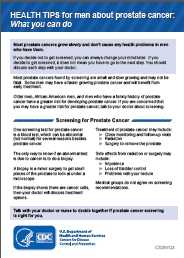Should I Get Screened for Prostate Cancer?
CDC and other federal agencies follow the prostate cancer screening recommendations set forth by theU.S. Preventive Services Task Force, which recommends against prostate specific antigen (PSA)-based screening for men who do not have symptoms. Other organizations, like the American Urological Association, the American Cancer Society, and theAmerican College of Physicians may have other recommendations.
A PSA test can find prostate cancer earlier than no screening at all. However, the PSA test may have false positive or false negative results. This can mean that men without cancer may have abnormal results and get tests that are not necessary. It could also mean that the test could miss cancer in men who may need to be treated.
Abnormal results can cause anxiety. The test that comes after an abnormal result on a PSA test is a biopsy (a minor surgery to get small samples of prostate cells or tissues), which can cause pain, infection, bleeding, and may even miss cancer that needs to be treated.
Talk to your doctor about the right decision for you.
Informed Decision Making
Understanding that men and their doctors may continue to screen for prostate cancer, CDC continues to support informed decision making. Informed decision making occurs when a man—
- Understands the nature and risk of prostate cancer.
- Understands the risks of, benefits of, and alternatives to screening.
- Participates in the decision to be screened or not at a level he desires.
- Makes a decision consistent with his preferences and values.
More Information
- U.S. Preventive Services Task Force fact sheet: Screening for Prostate Cancer [PDF-466KB]
- Understanding Prostate Changes: A Health Guide for Men (National Cancer Institute)
- Postate-Specific Antigen (PSA) Test (National Cancer Institute)
- Page last reviewed: July 19, 2016
- Page last updated: August 30, 2017
- Content source:
- Maintained By:


 ShareCompartir
ShareCompartir
